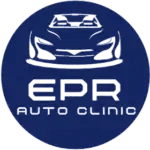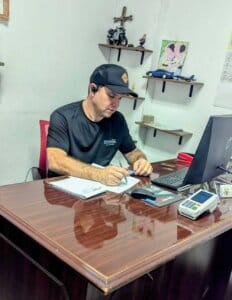Don’t Let Simple Mistakes Cost You Thousands
Keeping your car in good shape doesn’t have to be complicated. In fact, most expensive problems happen because of simple mistakes that people don’t even realize they’re making. At EPR Auto Clinic in Newark, we see the same avoidable issues come through our shop every day.
We’ve put together this list of 7 car mistakes that are easy to avoid but can save you from major headaches and hefty repair bills down the road. Let’s dive in!
1. Ignoring Dashboard Warning Lights
You know that little light that pops up on your dashboard, like the dreaded “check engine” light? Many people ignore it, hoping it’ll just go away. But those lights are there for a reason! Think of them as your car’s way of saying, “Hey, I need some attention here!”
What might seem like a minor issue could actually be a serious problem that, if left unchecked, becomes a ticking time bomb and costs way more to fix later.
Warning Signs to Watch For:
- Check Engine Light (can indicate hundreds of different issues)
- Oil Pressure Warning (critical – pull over immediately!)
- Battery/Charging System Light
- Brake System Warning Light
- Temperature Warning (overheating)
- Tire Pressure Monitoring System (TPMS) Light
- ABS Warning Light
What to Do Instead:
When a warning light comes on, don’t panic, but don’t ignore it either. Take your car to a trusted mechanic like EPR Auto Clinic to get it checked out. It’s like going to the doctor for a check-up; preventive care can save you from a much bigger problem. At EPR, we offer free diagnostic scans to identify what’s triggering that warning light.
2. Running on Empty – Always Driving with a Low Fuel Tank
Do you love pushing your luck and running on fumes? Think again! Your fuel pump sits inside the gas tank and uses gasoline to keep itself cool. When the fuel level gets too low, the pump runs hotter and can suck up sediment and debris that settles at the bottom of your tank. Over time, this wears out the pump and can clog your fuel filter.
Warning Signs Your Fuel Pump is Struggling:
- Car struggles to start or takes multiple attempts
- Engine sputters at high speeds
- Loss of power when accelerating
- Unusual whining noise from the rear of the vehicle
- Car surges forward unexpectedly
- Decreased fuel efficiency
What to Do Instead:
Try to keep your fuel tank above 1/4 full at all times. This protects your fuel pump and ensures you won’t get stranded. It’s a simple habit that can extend the life of your fuel system significantly. Plus, in Newark winters, you definitely don’t want to run out of gas in a snowstorm!
3. Forgetting to Check Tire Pressure
Underinflated or overinflated tires are dangerous. When your tire pressure is wrong, your car burns more fuel, your tires wear unevenly, and you lose control in curves or on wet roads. In New Jersey, where we experience all four seasons, temperature changes can significantly affect tire pressure.
Warning Signs of Tire Pressure Problems:
- Car pulls to one side while driving
- Tires look visibly flat or bulging
- Uneven tire wear patterns
- Decreased fuel economy
- Vibration in the steering wheel
- Your TPMS light is on
- Poor handling or longer stopping distances
What to Do Instead:
Check your tire pressure at least once a month and before any long trips. The correct pressure for your car is listed in your owner’s manual or on a sticker inside the driver’s door jamb or fuel door. Use an accurate tire gauge, don’t just eyeball it! Remember, tire pressure drops about 1 PSI for every 10-degree decrease in temperature, so check more frequently during seasonal changes.
Pro tip: Check tire pressure when the tires are cold (before driving) for the most accurate reading.
4. Skipping Oil Changes or Waiting Too Long
Oil is the lifeblood of your engine. It lubricates the moving parts so they don’t grind against each other and wear out. When oil gets old or dirty, it loses its ability to protect your engine, which can lead to overheating or even catastrophic internal engine damage.
Warning Signs You’ve Waited Too Long for an Oil Change:
- Oil Change or Maintenance Required light is on
- Engine makes knocking or rumbling sounds
- Oil looks dark black or gritty (check the dipstick)
- Unusual exhaust smoke
- Strong oil smell inside the car
- Engine running rougher than usual
- Decreased performance or fuel economy
What to Do Instead:
Keep track of your car’s mileage and follow your owner’s manual recommendations for oil change intervals. Different vehicles and oil types have different requirements, some need changes every 3,000 miles, others can go 7,500-10,000 miles with synthetic oil. This is one of the most important things you can do for engine health.
At EPR Auto Repair, we keep records of your service history so you never have to worry about remembering when your last oil change was. We’ll remind you when it’s time!
5. Using the Wrong Fluids
It might seem straightforward, but putting brake fluid in the power steering reservoir, for example, can be a disaster. Your car’s fluids, engine oil, coolant, brake fluid, transmission fluid, power steering fluid, are specific to each system. Using the wrong type can corrode components and cause serious failures.
Warning Signs You’ve Used the Wrong Fluid:
- System doesn’t work properly (brakes feel spongy, steering is stiff)
- Leaks appearing after fluid service
- Unusual smells (burning, chemical odors)
- Discolored or contaminated fluid
- Dashboard warning lights
- Corrosion around reservoir caps
- Strange noises from affected systems
What to Do Instead:
Always read your car’s owner’s manual and follow the recommendations exactly when it comes to which fluids to use. Each fluid has a specific formulation and mixing them or using the wrong type can cause chemical reactions that damage seals, gaskets, and internal components.
If you’re unsure, don’t hesitate to ask a trusted mechanic. At EPR, we always use manufacturer-specified fluids for every service to ensure compatibility and optimal performance.
6. Letting Rust Take Over
Rust might start as a small bubble in your paint, but it spreads underneath the body panels like a virus. If left untreated, it can compromise your car’s structural integrity and become very expensive to repair. In Newark, with our snowy winters and road salt, rust is a constant threat.
Warning Signs of Rust Problems:
- Small bubbles or blisters in the paint
- Brown or orange spots appearing on body panels
- Flaking paint exposing bare metal
- Holes developing in body panels or floor
- Rust stains under the car
- Corrosion around wheel wells
- Rust on the frame or undercarriage
- Water leaking into the cabin
What to Do Instead:
If you notice any sign of rust, even if it’s small, address it as soon as possible. The longer you wait, the more it spreads and the more expensive it becomes to fix. Take your car to a professional who can properly sand, treat, paint, and protect the affected area.
Prevention is key: Wash your car regularly, especially the undercarriage during winter months to remove road salt. Consider undercoating or rust-proofing treatments, especially if you plan to keep your car for many years.
7. Over-Tightening Lug Nuts
Cranking down too hard on the lug nuts that hold your wheels on can actually damage your brake rotors. This causes your car to shake or vibrate when you hit the brakes, leads to uneven tire wear, and in extreme cases, can even snap the wheel studs.
Warning Signs Your Lug Nuts Are Over-Tightened:
- Steering wheel vibrates or shakes when braking
- Pulsating brake pedal
- Unusual clicking or popping sounds from wheels
- Difficulty removing lug nuts during tire changes
- Warped or damaged brake rotors
- Broken wheel studs
- Uneven tire wear patterns
What to Do Instead:
Ideally, lug nuts should be tightened using a torque wrench set to your vehicle’s specification (usually between 80-100 ft-lbs, but check your manual). If you don’t have a torque wrench, tighten the lug nuts in a star pattern until they’re snug, don’t use all your strength.
At EPR Auto Clinic, we always use calibrated torque wrenches when mounting wheels to ensure proper tightness. After any tire service at our shop, we recommend returning after 50-100 miles for a complimentary re-torque to ensure everything remains secure.
The Bottom Line: Prevention is Cheaper Than Repair
Taking care of your car might seem like a lot of work, but these simple maintenance habits prevent major headaches and, of course, save you money. Think of it this way: a $50 oil change today prevents a $5,000 engine replacement tomorrow. Regular attention to these details keeps your car running smoothly and reliably for years.
When in Doubt, Trust the Experts at EPR Auto Clinic
At EPR Auto Clinic in Newark, NJ, we’ve seen firsthand what happens when these common car mistakes go unaddressed. Our experienced technicians are here to help you avoid these pitfalls with:
✓ Honest, transparent diagnostics
✓ Expert advice on proper maintenance schedules
✓ Quality service using the right parts and fluids
✓ Preventive maintenance programs to keep your car in top shape
✓ Fair pricing with no hidden fees
✓ Service reminders so you never miss important maintenance
Don’t wait until a small problem becomes a big expense. Whether you need a routine oil change, tire service, or are seeing a warning light, we’re here to help.
Schedule Your Maintenance Service Today!
Avoid these 7 car mistakes and keep your vehicle running strong. Visit EPR Auto Clinic in Newark for expert care you can trust.
Contact EPR Auto Clinic:
📍 Newark, NJ
Same-Day Service Available – Call ahead to check availability and minimize your wait time!
Quick Reference: Summary of the 7 Car Mistakes
- Ignoring Warning Lights → Get them checked immediately
- Running on Empty → Keep tank above 1/4 full
- Wrong Tire Pressure → Check monthly with a gauge
- Skipping Oil Changes → Follow manufacturer’s schedule
- Using Wrong Fluids → Always consult your owner’s manual
- Ignoring Rust → Treat small spots before they spread
- Over-Tightening Lug Nuts → Use proper torque specifications
EPR Auto Clinic – Your partner in preventive car care in Newark, NJ. We keep you on the road safely.





